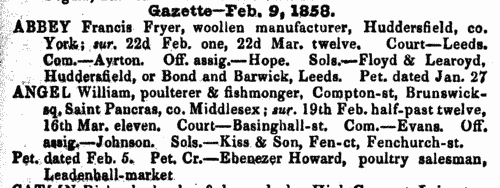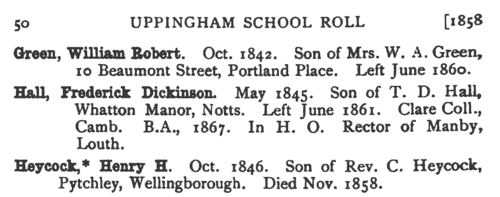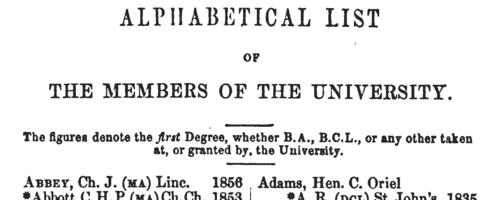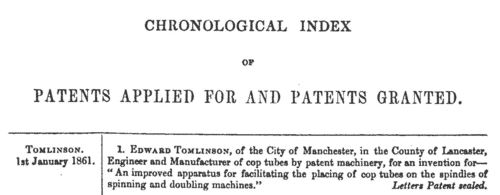Add this eBook to your basket to receive access to all 300 records. Our indexes include entries for the spelling ashwell. In the period you have requested, we have the following 300 records (displaying 201 to 210): These sample scans are from the original record. You will get scans of the full pages or articles where the surname you searched for has been found. Your web browser may prevent the sample windows from opening; in this case please change your browser settings to allow pop-up windows from this site. Bankrupts in England and Wales
(1858)
Perry's Bankrupt and Insolvent Gazette, issued monthly, included lists of bankruptcies and stages in the liquidation of the estate, payment of dividends, and discharge. The initial entry in this sequence gives the name of the bankrupt (surname first, in capitals), the date gazetted, address and trade (often with the phrase dlr. and ch., meaning dealer and chapman); the dates and times and courts of the official processes of surrender; the surname of the official commissioner (Com.); the surname of the official assignee; and the names and addresses of the solicitors; the date of the fiat; and whether on the bankrupt's own petition, or at the demand of petitioning creditors, whose names, trades and addresses are given. In subsequent entries the bankrupt is often merely referred to by name and trade. This is the index to the names of the bankrupts, from the issues from January to December 1858, which may or may not include the detailed first entry for any particular individual. | Sample scan, click to enlarge

| Insolvents
(1858)
Insolvency notices for England and Wales: insolvency often caused people to restart their lives elsewhere, so these are an important source for lost links | Sample scan, click to enlarge

| Patentees of New Inventions
(1859)
Abstracts of British patents for new inventions applied for and granted from 1 January to 31 December 1859: giving date, name and address, and short description of the invention. It is then stated whether 'Letters patent sealed' or 'Provisional protection only'. | Sample scan, click to enlarge

| Boys entering Uppingham School
(1860)
The public school at Uppingham in Rutland was founded by Archdeacon Johnson in 1584. A roll of scholars from 1824 to 1905 was edited by J. P. Graham, and published in 1906. This was a revision and updating of an 1894 edition of the roll, the great bulk of the work having been done by Mrs Mullins. The roll is arranged by year, and within each year by term of entrance, and then alphabetically by surname within each term. Each boy's name is given, surname first, with an asterisk where known (in 1906) to have died. Then there is month and year of birth, father's name (most often just surname and initials) and address (at entrance). Where the boy represented the school at Rugby football (XV) or cricket (XI), that is indicated. After the month and year of leaving the school, there is a brief summary of achievements in later life, and, where known, address as in 1906. | Sample scan, click to enlarge

|  British infantry fighting in China
(1860) British infantry fighting in China
(1860)
The China Medal was awarded to soldiers and sailors who took part in the prosecution of the war against the Chinese from 1856 to 1860. Separate clasps were awarded for men who had been in receipt of the China Medal of 1842; for being actually present at Canton on 28 and 29 December 1857, when that city was bombarded and finally captured; for being actually engaged in the operations which ceased with the first capture of the Taku Forts, 20 May 1858, and led to the Treaty of Tientsin; for being actually present at the capture of the Taku Forts 21 August 1860; and for being actually present before Pekin the day the gate of that city was given up to the allied (British and French) army, viz. on 13 October 1860. The 31st (the Huntingdonshire) Regiment of Foot, based at Chatham, embarked for Corfu 24 January 1853, served in the Crimea, had arrived in India by 1859, and was transferred to China in 1860, returning to England in 1863. The regiment took part in the capture of the Taku Forts. | Sample scan, click to enlarge

| Members of Oxford University
(1860)
The Oxford University Calendar for 1860 includes this list of all living members of the university, i. e. not only undergraduates and members of staff, but also all surviving graduates from earlier generations. The names are arranged alphabetically by surname, then by college in order of foundation. Surnames are given, initials, highest degree, name of college, and then the year of graduating the first degree. For undergraduates only name and college is given. An asterisk before a surname indicates a member on the foundation of the college. | Sample scan, click to enlarge

| Long-stay Paupers in Workhouses: Bedford
(1861)
This comprehensive return by the Poor Law Board for England and Wales in July 1861 revealed that of the 67,800 paupers aged 16 or over, exclusive of vagrants, then in the Board's workhouses, 14,216 (6,569 men, 7,647 women) had been inmates for a continuous period of five years and upwards. The return lists all these long-stay inmates from each of the 626 workhouses that had been existence for five years and more, giving full name; the amount of time that each had been in the workhouse (years and months); the reason assigned why the pauper in each case was unable to sustain himself or herself; and whether or not the pauper had been brought up in a district or workhouse school (very few had). The commonest reasons given for this long stay in the workhouse were: old age and infirm (3,331); infirm (2,565); idiot (1,565); weak mind (1,026); imbecile (997); and illness (493). | Sample scan, click to enlarge

| Long-stay Paupers in Workhouses: Leicester
(1861)
This comprehensive return by the Poor Law Board for England and Wales in July 1861 revealed that of the 67,800 paupers aged 16 or over, exclusive of vagrants, then in the Board's workhouses, 14,216 (6,569 men, 7,647 women) had been inmates for a continuous period of five years and upwards. The return lists all these long-stay inmates from each of the 626 workhouses that had been existence for five years and more, giving full name; the amount of time that each had been in the workhouse (years and months); the reason assigned why the pauper in each case was unable to sustain himself or herself; and whether or not the pauper had been brought up in a district or workhouse school (very few had). The commonest reasons given for this long stay in the workhouse were: old age and infirm (3,331); infirm (2,565); idiot (1,565); weak mind (1,026); imbecile (997); and illness (493). | Sample scan, click to enlarge

| Long-stay Paupers in Workhouses: Orsett
(1861)
This comprehensive return by the Poor Law Board for England and Wales in July 1861 revealed that of the 67,800 paupers aged 16 or over, exclusive of vagrants, then in the Board's workhouses, 14,216 (6,569 men, 7,647 women) had been inmates for a continuous period of five years and upwards. The return lists all these long-stay inmates from each of the 626 workhouses that had been existence for five years and more, giving full name; the amount of time that each had been in the workhouse (years and months); the reason assigned why the pauper in each case was unable to sustain himself or herself; and whether or not the pauper had been brought up in a district or workhouse school (very few had). The commonest reasons given for this long stay in the workhouse were: old age and infirm (3,331); infirm (2,565); idiot (1,565); weak mind (1,026); imbecile (997); and illness (493). | Sample scan, click to enlarge

| Patentees of New Inventions
(1861)
Abstracts of British patents for new inventions applied for and granted from 1 January to 31 December 1861: giving date, name and address, and short description of the invention. It is then stated whether 'Letters patent sealed' or 'Provisional protection only'. | Sample scan, click to enlarge

|
Research your ancestry, family history, genealogy and one-name study by direct access to original records and archives indexed by surname.
|












